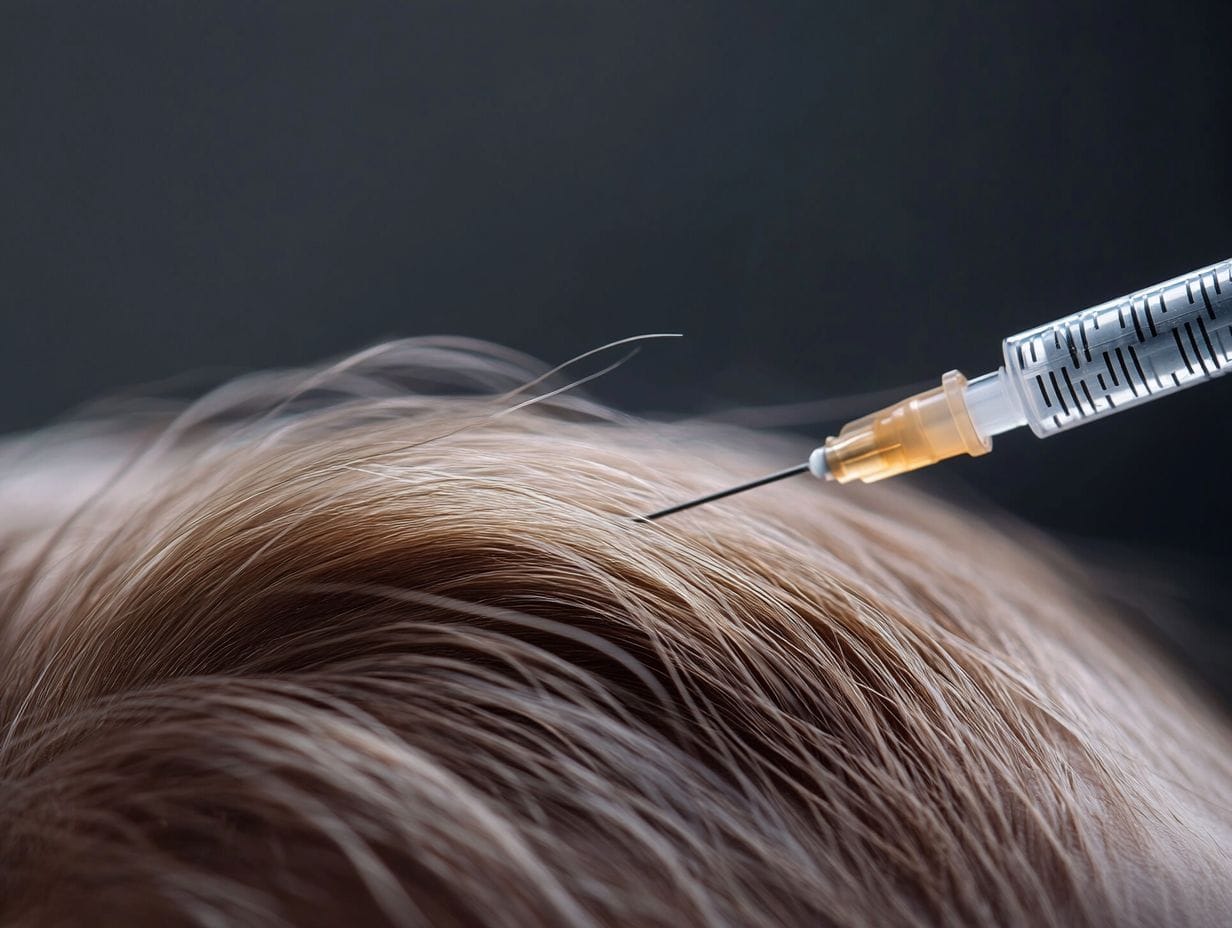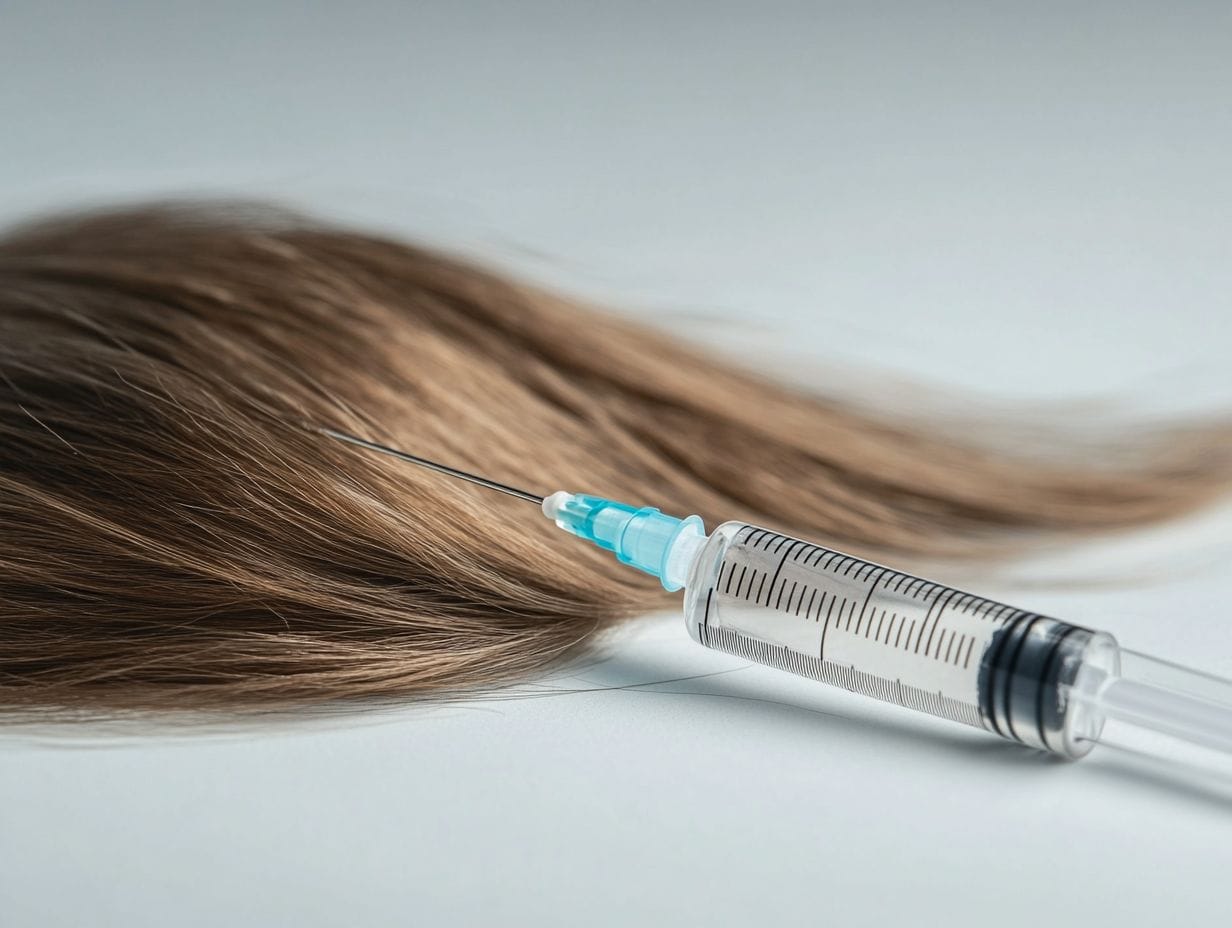Hair loss is a common concern that affects millions, prompting individuals to seek effective solutions.
While traditional methods like synthetic hair implants have been popular, innovative treatments like exosome therapy are gaining attention for their potential benefits.
This article explores the causes and prevalence of hair loss, compares the effectiveness and safety of these two approaches, and discusses factors to consider when choosing the right solution.
Dive into the latest developments in hair loss treatment and discover what might work best for you.
The Problem of Hair Loss

Hair loss is a widespread concern that affects millions of individuals globally, presenting in various forms such as androgenetic alopecia, stress-induced shedding, and other related conditions.
This issue not only affects physical appearance but also has a profound impact on psychological well-being, often resulting in diminished self-esteem and increased anxiety. Understanding the underlying causes of hair loss is essential for the development of effective hair restoration strategies.
Numerous factors, including genetics, hormonal changes, medical conditions, and environmental influences, contribute to hair thinning. This underscores the necessity for personalised solutions that cater to the specific needs of individual patients.
Understanding Causes and Prevalence
The causes of hair loss are diverse and multifaceted, with androgenetic alopecia being the most prevalent form affecting both men and women. This is followed by other conditions such as alopecia areata and telogen effluvium.
Androgenetic alopecia, commonly referred to as male or female pattern baldness, accounts for approximately 95% of hair loss cases, highlighting its significant impact. In this condition, dihydrotestosterone (DHT), a derivative of testosterone, targets hair follicles, leading to progressive thinning of hair and potentially resulting in complete baldness.
Alopecia areata is an autoimmune disorder characterised by sudden hair loss, often presenting in patches, and affects approximately 2% of the population, with younger individuals being particularly susceptible. Conversely, telogen effluvium typically arises from factors such as stress, hormonal changes, or nutritional deficiencies, resulting in an increased number of hair follicles transitioning into the shedding phase.
Understanding these conditions and their prevalence is essential, as it enables individuals to recognise symptoms and encourages early intervention, thereby improving the likelihood of hair retention.
Traditional Solutions for Hair Loss
Traditional solutions for hair loss have historically encompassed both surgical options, such as hair transplants, and non-surgical procedures, including topical treatments and synthetic hair implants. Although hair transplant techniques have advanced considerably, yielding more natural-looking outcomes, they necessitate thorough consideration of factors such as recovery time and financial implications.
Conversely, non-surgical options attract individuals seeking minimally invasive yet effective methods for hair restoration. It is crucial for individuals exploring solutions to hair loss to understand the advantages and disadvantages associated with each treatment option.
Overview of Synthetic Hair Implants
Synthetic hair implants offer a non-surgical solution for individuals experiencing hair loss, delivering immediate cosmetic enhancement without the need for invasive procedures. These implants are meticulously designed to replicate natural hair, providing a viable option for those looking to restore their hairline while mitigating the risks associated with surgical interventions.
Plus enhancing aesthetic appeal, synthetic hair implants typically require minimal maintenance compared to traditional hair restoration techniques, making them particularly appealing for individuals with demanding schedules. Users have reported high levels of satisfaction, appreciating their ability to achieve a fuller appearance promptly and without the downtime frequently associated with other treatments.
Case studies have demonstrated numerous success stories, illustrating how patients have regained their confidence and improved their quality of life following the adoption of synthetic hair implants. The combination of immediate results and ease of care ensures that this innovative solution effectively addresses the diverse needs of individuals confronting hair loss.
Introducing Exosome Therapy
Exosome therapy has emerged as a transformative approach in the field of hair restoration, leveraging the principles of cellular therapy to stimulate hair follicle growth and address hair thinning.
This innovative treatment employs exosomes derived from stem cells to deliver concentrated growth factors and therapeutic proteins directly to the scalp, thereby promoting cellular healing and improving scalp health.
Exosome therapy signifies a significant advancement in regenerative medicine, presenting a promising alternative for individuals in search of effective and non-invasive solutions for hair loss.
What is Exosome Therapy?

Exosome therapy utilises exosomes, which are nano-sized extracellular vesicles essential for intercellular communication, to stimulate and rejuvenate hair follicles.
These exosomes are enriched with a diverse range of growth factors, cytokines, and therapeutic proteins that are vital for promoting cellular regeneration and enhancing overall hair health. By releasing these beneficial molecules, the therapy aids in the repair of damaged hair follicles while encouraging increased blood flow and nutrient delivery to the scalp. For those considering treatment options, understanding minoxidil vs. mesotherapy can provide insight into which method may offer better results for hair loss.
Recent studies indicate that patients receiving exosome therapy experienced a significant increase in hair density and thickness within a few months, underscoring its potential as a non-invasive treatment option. For those exploring options, understanding hair transplants vs. laser caps can pave the way for more effective and enduring results in hair restoration efforts.
Comparing Exosome Therapy and Synthetic Hair Implants
In comparing exosome therapy and synthetic hair implants, it is crucial to assess factors such as effectiveness, safety, and long-term outcomes, as both treatment options address distinct patient needs and preferences.
Effectiveness and Safety
Effectiveness and safety are critical factors when assessing exosome therapy and synthetic hair implants as potential hair restoration options, as each presents distinct advantages and associated risks.
Recent studies have illuminated the comparative clinical outcomes of these two hair restoration techniques. Exosome therapy, an innovative approach derived from stem cells, has demonstrated promising results in promoting hair follicle regeneration and enhancing hair density, while also exhibiting a favourable safety profile with minimal adverse effects. For those considering their options, understanding hair transplant surgery vs. exosome therapy can help in making the best choice.
Conversely, synthetic hair implants provide immediate results but carry a higher risk of complications, such as infection or rejection. Research reveals varying rates of patient satisfaction associated with each method, including laser therapy vs. exosome therapy, underscoring the necessity for further investigation to ascertain which option may best meet individual needs and preferences.
Cost and Maintenance
Cost and maintenance are pivotal factors in the decision-making process between exosome therapy and synthetic hair implants, as each option carries distinct financial implications and care requirements.
A thorough cost analysis is essential for patients to make informed decisions regarding their hair restoration journey. For example, exosome therapy typically involves initial expenses related to the procedure, including evaluation fees and potential follow-up treatments necessary to maintain efficacy. Conversely, synthetic hair implants generally incur costs associated with the surgical procedure and subsequent consultations for adjustments or replacements. For a detailed comparison, check out minoxidil vs. exosome therapy to see which yields better hair growth results.
The maintenance routines for these options can also vary significantly. While exosome therapy may necessitate periodic treatments to achieve optimal results, synthetic implants require ongoing care to ensure they remain secure and preserve a natural appearance.
Understanding these factors is crucial as they can greatly influence overall satisfaction with the selected treatment, with costs and maintenance routines directly impacting long-term outcomes.
[second_cta_shortcode]Choosing the Best Solution for You
Selecting the most appropriate solution for hair loss requires a thorough evaluation of various hair restoration methods, considering individual needs, preferences, and medical histories.
Factors such as the degree of hair loss, desired outcomes, and personal lifestyle must be meticulously assessed when evaluating options such as exosome therapy and synthetic hair implants. Patient education plays a pivotal role in this process, ensuring that individuals are adequately informed about their choices and the potential effectiveness of each treatment, including hair transplant vs. laser therapy.
Ultimately, personalised treatments that are tailored to the specific demographics of patients can result in enhanced satisfaction and outcomes.
Factors to Consider
When evaluating hair restoration methods, several factors must be considered, including the patient's age, genetic background, severity of hair loss, and overall health. These factors can significantly impact the effectiveness of various treatment options, such as exosome therapy for hair loss or synthetic hair implants, and should be thoroughly assessed to develop a tailored solution that addresses the individual needs of each patient. A comprehensive understanding of these factors facilitates well-considered choices regarding hair loss prevention and restoration.
For example, younger patients may exhibit a more favourable response to non-surgical treatments like PRP (Platelet-Rich Plasma) therapy, which utilises the body s natural healing capabilities, while older individuals may necessitate more invasive techniques to achieve optimal results.
Genetics also play a pivotal role; certain individuals may be predisposed to respond positively to specific treatments based on familial hair loss patterns.
Research indicates that individuals who maintain a healthy lifestyle, characterised by a balanced diet and regular exercise, frequently experience better outcomes with hair restoration therapies, as their overall health can positively influence hair follicle rejuvenation and growth.
Case studies demonstrate that personalised approaches, which account for these variables, often lead to higher satisfaction and success rates, underscoring the importance of a careful selection process in achieving desired results.
Potential Future Developments in Hair Loss Treatment
The future of hair loss treatment presents promising possibilities, propelled by innovative therapies and advancements in biotechnology designed to improve the efficacy of hair restoration methods.
Researchers are consistently investigating new approaches, including experimental therapies that utilise cellular healing, regenerative medicine, and other cutting-edge technologies to more effectively address hair loss.
As the understanding of the hair growth cycle and biological responses to various treatments continues to advance, the potential for more effective and personalised solutions for hair loss becomes increasingly significant.
New Technologies and Research Studies
Recent advancements in technology and ongoing research studies are paving the way for more effective hair loss treatments, emphasising evidence-based solutions that incorporate therapeutic proteins and cellular therapies.
Recent findings indicate that these innovations not only address the underlying causes of hair loss but also enhance hair health and resilience in ways previously considered unattainable. Clinical studies have demonstrated the efficacy of platelet-rich plasma (PRP) therapies, which leverage the body s natural healing properties to stimulate hair follicles. For those seeking a comprehensive overview, a comparison of laser therapy vs. PRP can provide insights into effective treatments. Additionally, researchers are investigating gene therapy techniques that may provide lasting solutions for individuals experiencing pattern baldness.
Through the integration of innovative strategies and an enhanced understanding of hair biology, the field of hair loss treatment is evolving, offering promising outcomes for many individuals seeking effective solutions, including insights on scalp micropigmentation vs. hair transplants.
Frequently Asked Questions
What is Exosome Therapy and how does it compare to Synthetic Hair Implants?
Exosome Therapy for hair loss is a relatively new treatment for hair loss that involves injecting exosomes, which are small particles that contain growth factors, into the scalp. Synthetic Hair Implants, on the other hand, involve surgically implanting artificial hair into the scalp. Both treatments aim to stimulate hair growth, but they differ in their methods and effectiveness.
How does Exosome Therapy stimulate hair growth?
Exosomes contain growth factors, which are proteins that promote cell growth and division. When injected into the scalp, they can stimulate the hair follicles to grow new hair and improve the overall health of the scalp. Exosome Therapy can also increase blood flow to the scalp, providing essential nutrients to the hair follicles.
What are the potential side effects of Exosome Therapy and Synthetic Hair Implants?
Exosome Therapy for hair loss is generally considered a safe and non-invasive treatment for hair loss, with minimal side effects such as mild swelling or redness at the injection site. Synthetic Hair Implants, on the other hand, require surgery and may have more significant risks, including infection, scarring, and allergic reactions to the implant material.
Which treatment has a higher success rate for hair growth?
The success rate of Exosome Therapy and Synthetic Hair Implants vary depending on the individual and the extent of their hair loss. However, Exosome Therapy has shown promising results, with some studies reporting a success rate of up to 80%. Synthetic Hair Implants have a lower success rate, with around 50-70% of implanted hair surviving long-term.
Is Exosome Therapy or Synthetic Hair Implants a permanent solution for hair loss?
Neither Exosome Therapy nor Synthetic Hair Implants can guarantee permanent hair growth. Exosome Therapy may require maintenance sessions to sustain hair growth, while Synthetic Hair Implants may require touch-up surgeries to maintain the desired appearance. Both treatments can slow down or reverse hair loss, but they may not be a permanent solution.
Which treatment is more cost-effective in the long run?
Exosome Therapy is generally more affordable than Synthetic Hair Implants, at least in the short term. While the initial cost of Synthetic Hair Implants may be higher, they may require fewer maintenance sessions compared to Exosome Therapy, making them more cost-effective in the long run. However, the cost of each treatment may also vary depending on the individual's needs and the clinic's location.


